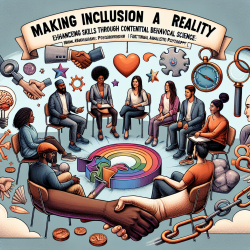In the world of mental health, ensuring that therapeutic approaches are inclusive and effective for all communities is crucial. Recent research titled "The Illusion of Inclusion: Contextual Behavioral Science and the Black Community" sheds light on the gaps in current practices and offers valuable insights for practitioners looking to improve their skills and promote diversity.
Understanding Contextual Behavioral Science (CBS)
Contextual Behavioral Science (CBS) underpins therapies like Acceptance and Commitment Therapy (ACT) and Functional Analytic Psychotherapy (FAP). While these therapies have shown efficacy among predominantly White populations, their effectiveness within Black communities remains underexplored. This research emphasizes the need for culturally sensitive adaptations to address racial stress and trauma.
The Need for Ethnoracial Sensitivity
The research highlights that while ACT and FAP can be beneficial for various mental health conditions, they often fall short in addressing the unique experiences of individuals from diverse ethnoracial backgrounds. Practitioners are encouraged to tailor their approaches to be more inclusive and responsive to the specific needs of Black clients.
Practical Steps for Practitioners
- Engage in Continuous Learning: Attend workshops and webinars focused on cultural competence and anti-racism in therapy.
- Collaborate with Diverse Communities: Work with community leaders to understand the specific mental health needs of Black individuals.
- Advocate for Research Representation: Support studies that include diverse populations to ensure that therapeutic approaches are effective across different groups.
- Implement Tailored Interventions: Adapt CBS techniques to address racial trauma and stressors unique to Black clients.
Encouraging Further Research
The research calls for more studies focusing on the efficacy of CBS therapies within racially marginalized groups. Practitioners are encouraged to participate in or support research efforts that aim to fill these gaps, ensuring that therapeutic practices evolve to meet the needs of all communities effectively.
The journey towards true inclusion requires ongoing commitment and action. By embracing these insights and implementing practical steps, practitioners can enhance their skills and contribute to a more equitable mental health landscape.
To read the original research paper, please follow this link: The illusion of inclusion: contextual behavioral science and the Black community.










